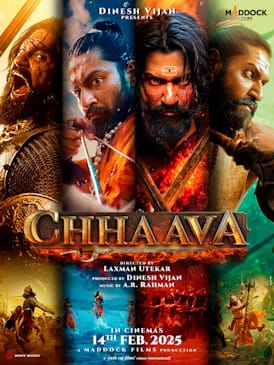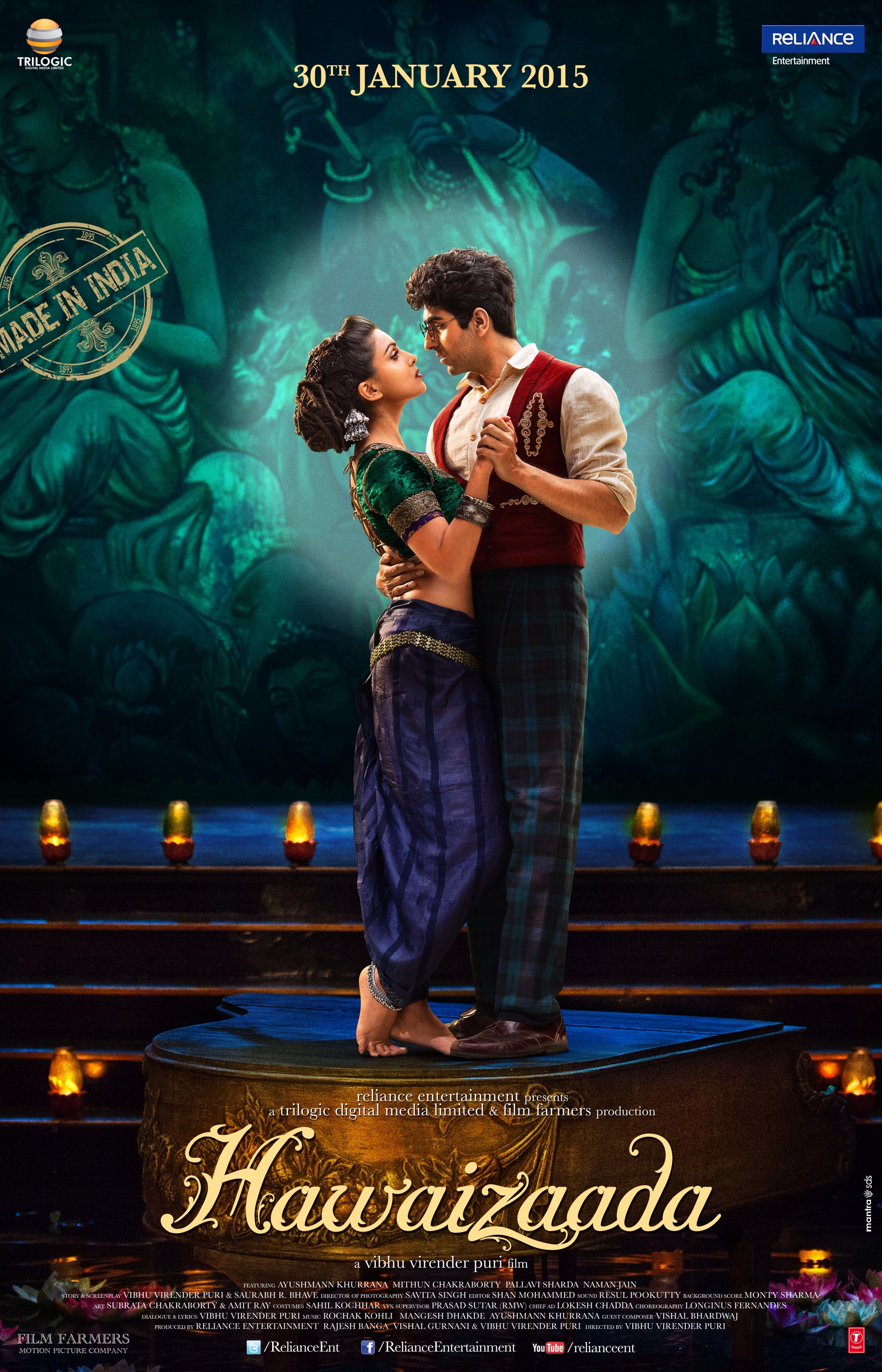Laxman Utekar’s directorial historical drama Chhaava is indeed a must-watch cinematic masterpiece for its emotional drama, storytelling, grandeur and fight sequences. Adapted from Shivaji Sawant’s novel Chhaava, the film brings to life the legacy of the courageous Maratha warrior King Chhatrapati Shivaji Maharaj taken forward by his son Chattrapati Sambhaji Maharaj. Sambhaji fought against the Mughal Emperor Aurangzeb, roaring like a lion till his last breath. Sadly the tale of his valour, resilience and pain was lost in the history books, while he was overshadowed by the legacy of his father.
The film begins with the narration of the history of the Maratha Empire spread across the Deccan by Ajay Devgan, with the help of exotic wall sculptures, defining the aesthetics of the film from the very first moment. The prosperous Maratha Empire under the reign of Chhatrapati Shivaji Maharaj came into scrutiny after his demise, when the Mughal emperor Aurangzeb (Akshay Khanna) laid his eyes on it, thinking that it has no heir and then emerged the Chhaava.
Vicky Kaushal, the heart and soul of Chhaava, nailed in portraying Sambhaji (Shambhu) as a strong, courageous leader who’s portrayed as the cub of a lion King Shivaji Maharaj who was hailed as ‘Chhaava’.The film indeed happens to be one of the finest performances in his entire career, as you don’t see Vicky Kaushal but the larger-than-life Sambhaji Maharaj, an epitome of courage, bravery and valour. He took forward Shivaji’s vision, instilling the values of Akhand Swaraj, wherein every individual of his kingdom, had the right to live a king-size fulfilled life, with no barriers of religion, caste, creed or status.
Sambhaji’s character has many layers as on the battlefield he fights like a lion King who can single-handedly fight battalions of enemies, who was an ardent patriot bestowing a strong mind, body and soul. Vicky has got into the skin of the character, portraying his bravery and military intelligence, which shows his extensive training of gorilla war skills in the fight sequences, his presence of mind and his never-dying attitude in the midst of adversity.The film boasts of well-executed elaborate battle scenes with some great stunts by Vicky especially the one when he fights a lion tearing off his mouth.
The film also portrays Sambhaji as a vulnerable and profoundly human, who owns a soft, compassionate heart. In one of the fight scenes, he finds a little child stuck in the battle, while he picks him and hands him over to his mother. The scene reflects his internal emotional conflict, as he is shown lost thinking about his mother ( Aai) who died when he was an infant. He constantly imagines her existence discussing it with his wife, Maharani Jesubai.
The film also takes the audience to his subconscious realm while he converses with his father Shivaji Maharaj, who guides his way against any deadlock.It not only throws light into many aspects of Sambhaji’s personal life but also the internal conflicts of the Maratha empire and, most sadly, the traitors who led to Sambhaji’s defeat.
Jesubai ( Rashmika Mandanna), whom Sambhaji calls Shri Sakha, is his eternal companion, as they are compared with Radha and Krishna. She understands Sambhaji inside out, while their relationship is shown to be very telepathic. Rashmika Mandanna excels in portraying Jesubai for the emotional sensibility and maturity of the character, as a completely dedicated wife. Her eyes say it all, while her bubbly self lights up the screen, every time she meets Sambhaji. Draped in gorgeous Paithani silks and traditional Maratha Jewellery with a big red bindi on her forehead, Rashmika looks elegant as the quintessential Hindu Queen.
Akshay Khanna’s portrayal of Aurangzeb is outstanding, while he commands screen presence as an antagonist who is cold, calculative and power-hungry. Aurang, who was one of the most barbarous and hard-headed Mughal emperors, snatched the throne, imprisoning his father Shahjahan, which he proudly boasts. His fragile body with cruel gruesome eyes, portrays his cold heart lacking any warmth. While he sits on his throne while he knits, his mind constantly manipulates strategies to conquer the Deccan, while he eventually succeeds in capturing Sambhaji by luring his confidantes.
The face-offs between Aurang and Sambhaji are some of the film’s most gripping moments, giving viewers goosebumps. Despite his win, Aurang stands weak in front of the captivated Sambhaji who addresses him as a loser who stood there without his crown. Aurang orders gruesome atrocities on strong-willed Sambhaji who fails to break down as he banks on his eternal faith and hails ‘Jai Bhawani’.
In one of the conversations between Akbar and Sambhaji, Akbar is seen seeking his help to take revenge from his father, Aurangzeb, while he boasts of the barbarous Mughal history where throwns are snatched. The film portrays both Akbar and Aurang stand in stark contrast with the braveheart Sambhaji, who boasts of his empire where thrones are earned by the Bravehearts capable of being the king, or else not.
The film also boasts of some stellar performances by Ashutosh Rana as Sarsenapati Hambirrao Mohite, whose every drop of blood was dedicated to protecting Sambhaji, adding depth to the historical narrative. Vineet Singh, as Kavi Kalash who’s Sambaji’s best friend and a loyal companion stands as a powerful and a memorable character. The concluding part of the film, boasts of their poetic jugalbandi wherein the Kavi and Sambhaji praise each other with a series of poetic verses. Kavi calls himself the salt to be rubbed on the enemy’s wounds, while Sambhaji hails him as a Chandan Tilak, whom every Maratha adorns on his forehead with pride.
The film’s background score by A R Rehman complements every scene in the narrative perfectly, enhancing its emotional appeal transporting the audience to a bygone era.The songs ‘Toofan’ and ‘Zinda Hai’ are vibrant melodies which depict the courage and never say die attitude of the Maratha lion King Chhatrapati Sambhaji in the battlefield. While the song ‘Rudra’ depicted the devastating energy of Shiva beginning with the vibration of the damru, which can destroy the evil negative force and ego of the enemy.While the songs powerful chants depicted the devotion of the Maratha King Sambhaji who was an ardent Shiv Bhakta.
Visually, Chhaava is a cinematographic masterpiece that captures the grandeur of the Maratha empire, with battle sequences that are both epic and meticulously choreographed. The film takes you to the grandeur and aesthetics of both the Mughal and Maratha architecture, costumes, jewellery and elegance of the royalties complimenting each other, giving a glimpse of the films Bajirao Mastani and Padmawat at some points.
Overall, it is a must-watch family drama for all the patriots of India, which takes you to the contribution of the Maratha Rulers in preserving the tradition and culture of Bharat from it’s foreign invaders.
FF Ratings: ⭐️⭐️⭐️⭐️


